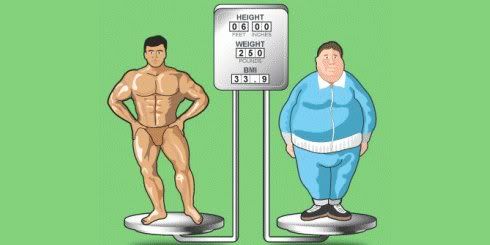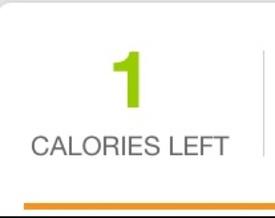BMI Confusion....

DietingMommy08
Posts: 1,345 Member
Sooo I was looking up my BMI and I was calculating what I would be under if I reached my goal weight....
Being 5'3 if I got to my goal weight of 145 I would still be considered overweight.
I would really have to lose 5 more pounds to be at a healthy normal weight.
Honestly I really dnt even wanna get down to 145... id be happier at 150.
I really dnt wanna be "Skinny" i just wanna be healthy.
Anybody else battling with this same confusion on wat to do?!
Being 5'3 if I got to my goal weight of 145 I would still be considered overweight.
I would really have to lose 5 more pounds to be at a healthy normal weight.
Honestly I really dnt even wanna get down to 145... id be happier at 150.
I really dnt wanna be "Skinny" i just wanna be healthy.
Anybody else battling with this same confusion on wat to do?!
0
Replies
-
BMI is not designed to be used by individuals.0
-
You have to take it all with a grain of salt. BMI charts are not necessarily completely accurate for everyone - for example people that do a lot of strength training and have a lot of muscle might be extremely healthy with a low bodyfat percentage, but their weight might be higher and the BMI chart might tell them they are 'overweight' even though their bodyfat is in a low healthy range.
Also, 145 lbs is a long way off for you. You never know how you are going to look and feel when you get there. It might be that you are in great shape from working out and have muscle and look and feel amazing - if that's the case, then yeah don't stress over those 5 lbs if you look and feel good and your dr. says you're healthy. On the other hand, you might get there and not be in quite the shape you were expecting and might find that yes another 5 lbs sounds like a good idea, or maybe that you're happy with the number on the scale but want to workout to condition your muscles and decrease bodyfat but not stress over the number on the scale. Don't feel like that goal weight is set in stone. Focus more on your progress and how you look and feel rather than worrying too much about that long-range ultimate goal - a lot of people find that as they get closer to the goal they set, their idea of a healthy and happy goal changes. Just worry about the journey for now, and worry about the destination when you actually get there. :-)0 -
The BMI gets a lot of hate, but it's not as bad as people make it sound. It's not accurate if you have a lot of muscle mass, but other than that, it's a decent general guideline.
That said, missing the BMI target by 5 pounds, even if you're not muscular, doesn't mean anything. Keep in mind, however, that people usually underestimate how much weight the need to lose.0 -
I think what's important, is to be comfortable with how you look and feel. Everyone is different. Personally, I've never been down to "normal weight. I am looking forward to seeing how I llok and feel at each weight. I will keep going down if I feel I need to,. but I also have a sponsor who will also help me determine if I am at a good weight, or need to lose more. My doctor will have her say as well. They have my back!
Best of Luck in All your endeavors!0 -
BMI is, as others said, just a rough guideline. If I didn't lose any lean muscle mass, I could be at 0% body fat and still be within my "healthy" BMI range! Percent body fat is a far better indicator.
That being said, as others have said, you may change your mind when you get there. I never thought I wanted to go below 145 because I wanted to keep some curves, but when I got that low and even below that, I was surprised that I could still look strong and curvy. It just seemed like such a low weight when I started. BUT you might get to 150 and realize that for your build, that is a healthy weight. It's all individual!0 -
Once you get there you may feel differently about it... the number might sound small but just wait and see once you get there.
 0
0 -
Once you get there you may feel differently about it... the number might sound small but just wait and see once you get there.

At around 160 I didnt like how skinny my face looked even though I was still in a size 13.
So I already know that I dont wanna be skinny like that.
Its not a look I personally find attractive. Lol.0 -
Once you get there you may feel differently about it... the number might sound small but just wait and see once you get there.

At around 160 I didnt like how skinny my face looked even though I was still in a size 13.
So I already know that I dont wanna be skinny like that.
Its not a look I personally find attractive. Lol.
Well whatever, stay overweight then. You don't have to go and say how skinny is unnatractive though.0 -
I have been looking at BMI also lately. To have a perfectly Healthy BMI it says I should be in the 150lb range. I have never been that small in my entire adult life. I wrestled 168 weight class in HS and have been 170ish in my 30's and I was skinny. So, just wondering how much faith should be placed on BMI for long term weight loss goals??0
-
It's quite a big range, tho'. For my height (5'5") the range is 111 to 150! I would never go as low as 111, but there's 30 lb. range there. I'm in the average, now, or 131-133, and that seems to be fine.0
-
Once you get there you may feel differently about it... the number might sound small but just wait and see once you get there.

At around 160 I didnt like how skinny my face looked even though I was still in a size 13.
So I already know that I dont wanna be skinny like that.
Its not a look I personally find attractive. Lol.
I've read some of the other replies and would encourage you to ignore those that are making grossly retarded statements. At the end of the day, you only have one life to live. How you look and feel are the most important thing in any of this. A couple of the posters gave some really good advice regarding BMI. My bodyfat is 25:3%, yet my BMI is 33, not taking into account the weight lifting that I have been doing over time and now the muscle built running. I admire the fact that you are brave enough to say and recognize that health is far more important than the numbers. Always chase your health and fitness first, and the numbers will work themselves out. If you look into that mirror, are healthy, and you like what you see, then that is all that matters. Stay strong, beautiful, solid, committed, and keep that fantastic mindset! Peace!0 -
You're better off setting a body fat % goal. Your ending weight would be different but a person with ideal body fat% is going to be healthier than a skinny person with no muscle. Those people are still at risk for the same diseases as obese people. Your goals will probably change as you get closer so why don't you set smaller goals like lose 10% of your body weight, then 5% body fat and so on. It makes the small victories much more rewarding as you see your progress, and it makes your progress easier to measure. Good Luck!0
-
The only people who are going to know your magic number is you, your doctor and whomever you chose to tell. If you are happy and HEALTHY what else matters?0
-
The BMI is simply a ROUGH estimate. It doesn't take into account your muscle mass, if you have bigger boobs or butt, anything like that.0
-
I agree that it varies depending on the person. For example, my boyfriend's BMI says he's overweight (he's 6'8 250) but because he was a professional athlete he has a lot of muscle. My plan is to try to get down to the suggested BMI range (if my body will allow me) and see if I like how I look. I figure as long as you're healthy and happy with how you look, that's what matters most.0
-
you have to remember that BMI leaves usually has error, but as everyone is saying is a general rough guidline. Skinny is not unattractive, BUT you have to be able to feel good about yourself as well. If its so confusing, forget about the BMI factor and just make yourself healthy by eating right and exercising. BMI is NOT the only factor in weight loss0
-
very true, this is some great adviceYou're better off setting a body fat % goal. Your ending weight would be different but a person with ideal body fat% is going to be healthier than a skinny person with no muscle. Those people are still at risk for the same diseases as obese people. Your goals will probably change as you get closer so why don't you set smaller goals like lose 10% of your body weight, then 5% body fat and so on. It makes the small victories much more rewarding as you see your progress, and it makes your progress easier to measure. Good Luck!0 -
It doesn't really take everything into account. The smallest I ever was was maybe 140lbs at 5'2". I was a black belt in karate and training a lot. I would love to be that size again or close to it but according to bmi I would be overweight.0
-
BMI, also known as the Quelet Index because it was designed by Adolphe Quelet, who was a statistician and not a focused on exercisers or how to maintain fitness but on the statistics of weight in relation to disease, is simply a ratio used to classify large populations of people for weight to determine if there was a correlation between weight and disease and mortality. The graph for all cause mortality is actually a J shape with being under weight according to BMI having a higher rate of death then being normal weight, and about the same as being overweight, with obesity having the highest correlation to all cause mortality. Anyway, that is why people say it shouldn't be used for individuals because it is just a statistic (And we all know there are 3 types of lies--Lies, Damn Lies, and Statistics! LOL) and not an actual measure of body fatness. That is why we were taught to use body composition to determine over fatness or under fatness instead of following the BMI scale for our clients in the exercise physiology program at college.0
-
And just to show the difference in being obese by BMI and actually over fat by body composition standards, here is a cute pic that has been around for a while.

it is not uncommon for someone who is losing weight and weight training to weigh more then what BMI says they should but be healthy or athletic on the body composition charts and it great health, not to mention look good. Personally, I'm obese according to BMI but I'm only 14.5% body fat and fit in a size 6 in pants and I'm no where near body builder standards yet with my exercise programs.0 -

Created by MyFitnessPal.com - Nutrition Facts For Foods
Experts rate the best and worst in body-fat measurement devices.
By Jeanie Lerche Davis
WebMD Weight Loss Clinic - Feature
Reviewed By Kathleen Zelman, MPH, RD, LD
Trying to get in shape? Then don't depend on your bathroom scales. To get the most accurate measure of your progress, experts say, you need to track your body fat as well as your weight.
"Most people focus only on losing weight, not on the fat," Cedric X. Bryant, PhD, chief exercise physiologist with the American Council on Exercise, tells WebMD.
"Preserving lean tissue and losing body fat -- that's what you need to strive for," Bryant says. "The only way to know how you're doing is through some form of body-composition assessment."
You know about the old standard measuring tools, like the body mass index (BMI) and the tape measure. And thanks to today's technology wizards, some very good new devices are available to measure your body fat.
To learn which are worth your time and money, WebMD got ratings from Bryant and from two more top exercise physiologists: Megan McCrory, PhD, an energy metabolism scientist with the Jean Mayer USDA Human Nutrition Research Center on Aging at Tufts University in Boston; and Len Kravitz, PhD, senior exercise physiologist for IDEA Health and Fitness Association.
The BMI Test
This is a simple calculation, using the most basic tools -- your height and weight. Plug these numbers into a BMI calculator to learn whether you are obese, overweight, or normal weight.
The BMI was developed using large, population-based studies. Though it doesn't address percentage of body fat or muscle, it helps health care professionals quickly assess which patients may be at risk of health problems linked to excess weight.
Price: None.
The verdict: Free and readily available; good for assessing health risks but doesn't measure body-fat percentage. If you are short, or very muscular, results tend to be less accurate.
"It's a good starting point, a really good way to get a basic estimate of whether you are overweight or not," says Bryant. "BMI tends to correlate pretty closely with health risks associated with being overweight or obese."
The experts' grade: D. "The BMI doesn't give you body fat measurement," says McCrory. "But if gives an excellent BMI measurement!"
Body Fat-Measuring Scales
"Bioelectrical impedance analysis" has been added to traditional bathroom scales. The scales send a harmless electrical current up through your body to "read" the amount of fat body mass and lean body mass -- calculating your percentage of body fat.
Price: $50 to $100 per scale.
The verdict: Convenient, but not always the most accurate.
"The problem is, these devices are very sensitive to hydration -- how much fluid is in your body," Bryant tells WebMD. So it's important to strictly follow the guidelines for weighing yourself -- time of day, fluid and food intake. Even your menstrual cycle affects this reading. "However, with all this factored in, the scales are an easy, at-home way to keep track of your weight and fat-loss progress."
There also are handheld versions that use this same technology. Just remember: You get what you pay for. Higher price equals greater accuracy.
Grade: C+. "Even though they may not be accurate, it may be good for tracking changes with a diet and exercise program," says McCrory. "Just keep in mind that the scales might be off by 5%, plus or minus. Follow the instructions carefully. Taking a shower beforehand really makes the reading inaccurate!"
DEXA Scanning
DEXA is "dual energy X-ray absorpitometry" -- the same imaging technology doctors use to measure bone density to determine osteoporosis risk, explains Bryant. During the test, you lie on an X-ray table for about 10 minutes while the scanner measures your body fat, muscle, and bone mineral density
Weight Scales Don't Tell The Whole Story (cont.)
Price: $200 to $300
The verdict: Looking good.
DEXA is "an emerging technique that holds a lot of promise," Bryant tells WebMD. "It allows us to determine the amount of body fat overall, and to identify fat deposits in specific body regions. That's very important, because stores of body fat can be much more indicative of disease risk." For example, extra abdominal fat increases the risk of heart disease, cancer, and type 2 diabetes.
Primary-care doctors, physical therapists, and health clubs will soon be offering DEXA scanning to assess body fat, Bryant tells WebMD. "If your BMI says you're in the obese category and you have a strong family history of heart disease and diabetes, it might behoove you to get more precise assessment of body composition," says Bryant.
Grade: A. "It's one of the most accurate methods out there," says McCrory. "I haven't heard any news about DEXA in health clubs. But if you have the opportunity to be tested by DEXA, go for it." She warns, however, that obese people may have a hard time lying on the narrow tables used for this test.
It's "quite noninvasive," says Kravitz. "Very good technique."
Also called hydrodensitometry testing, this involves getting into a tank filled with water. Based on the amount of water you displace, your body density and body fat can be calculated.
"This test is considered the gold standard, the most accurate assessment technique," Bryant tells WebMD. Universities use this primarily with athletes, and will likely let you try it, too -- for a small fee.
Price: $25 to $75 per test.
The verdict: "It's a very accurate way to measure body fat," says Bryant. But going into the water can be a problem. Some find the procedure "disconcerting."
Grade: B-. Inconvenience is a big issue here, agrees McCrory. "My guess is that underwater testing will be a 'has been' in a few years."
Bod Pod
The Bod Pod is a new tool that relies on air displacement to determine body fat, says Bryant. There's no submersion; you don't get wet. But you have to get into the Bod Pod chamber, be very still, control your breath � all factors that can affect the results. Your hydration level before the test can also affect results. "When all these are controlled pretty well, you'll get a body fat calculation that's within 3% to 4% accurate � not as high as one might expect," Bryant says.
Price: $40 to $65 per test.
The verdict: McCrory says she believes it may be the way of the future, though Bryant notes that it needs some refinement.
Grade: A. "It's much easier and more convenient than underwater weighing," says McCrory. "It is about as accurate and reliable as DEXA, is much cheaper, and is becoming more widely available."
The Tape Measure
It's one of the oldest "obesity tests" known to mankind. However, waist circumference in this context "is not defined as a seamstress would," says Bryant. "This is taken at the belly button level."
Men with measurements higher than 40, or women with waist measurements higher than 35, are considered obese, he says.
Price: None.
The verdict: This is a basic indicator of a body fat problem, says Bryant. "It's a good technique," says Kravitz.
Grade: A. Girth measurement is "accurate and reliable" for assessing your risk of chronic diseases like diabetes, heart disease, stroke, and cancer, says McCrory. Quite simply: The bigger the girth, the bigger the risk. "However, some new research is coming out suggesting that there is more risk than previously thought at even lower risk circumferences."
Skinfold Calipers
Health clubs offer this test; it's the most widely used method for measuring body fat, says Bryant. Basically, it's a "pinch" test using a measuring device at several points on the body, like thighs, hips, and upper arm.
Price: $20 to $40 per test.
The verdict: Much depends on the skills of the person giving you the test. "The skinfold test can be reasonably accurate," Bryant tells WebMD. "But if the tester isn't experienced, or if they're using cheapo plastic calipers, take it with a grain of salt. It will be terribly unreliable."
Grade: D. "These are rarely done correctly," says McCrory. "The technician usually does not grab enough fat so the result is usually a big underestimate of body fat. It's also difficult to grab the fat consistently."
Infrared Light Measuring
Infrared light measuring is an inexpensive way to measure body fat with a soil-analysis-type device that agronomists use, Bryant explains.
Here's what happens: A probe is placed on a body site -- the biceps, for instance -- sending an infrared light ray through both fat and muscle. Your height, weight, sex, age, frame size, and activity level are factored in. The final number is a "rough estimate" of your body fat percentage, says Bryant.
Price: $25 to $50 per test.
The verdict: "It hasn't proven to be terribly accurate," Bryant tells WebMD.
Grade: F. Don't waste your time or money, says McCrory.
Height/Weight Charts
These are the simple height-vs.-weight tables used for years by many insurance companies. But the experts say they just don't work very well, even if they take body frame and sex into account.
Price: None.
The verdict: "These charts have significant limitations," says Bryant. "They really aren't measuring fat-to-lean tissue. They are based on a limited sample of the population and can be misleading."
Grade: F. "These do nothing to help us understand body composition," Kravitz says.
Originally published March 19, 2004
Medically updated June 9, 2005.
SOURCES: Cedric X. Bryant, PhD, chief exercise physiologist, American Council on Exercise. Megan McCrory, PhD, energy metabolism scientist, Jean Mayer USDA Human Nutrition Research Center on Aging, Tufts University, Boston. Len Kravitz, PhD, senior exercise physiologist, IDEA.
©1996-2005 WebMD Inc. All rights reserved.0
This discussion has been closed.
Categories
- All Categories
- 1.4M Health, Wellness and Goals
- 398.2K Introduce Yourself
- 44.7K Getting Started
- 261K Health and Weight Loss
- 176.4K Food and Nutrition
- 47.7K Recipes
- 233K Fitness and Exercise
- 462 Sleep, Mindfulness and Overall Wellness
- 6.5K Goal: Maintaining Weight
- 8.7K Goal: Gaining Weight and Body Building
- 153.5K Motivation and Support
- 8.4K Challenges
- 1.4K Debate Club
- 96.5K Chit-Chat
- 2.6K Fun and Games
- 4.8K MyFitnessPal Information
- 12 News and Announcements
- 21 MyFitnessPal Academy
- 1.6K Feature Suggestions and Ideas
- 3.2K MyFitnessPal Tech Support Questions













